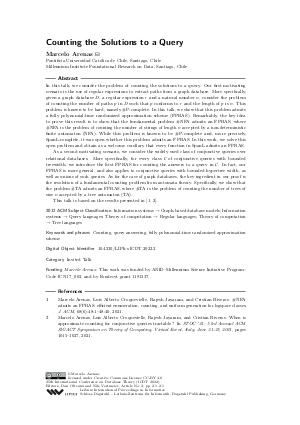Counting the Solutions to a Query (Invited Talk)
Author Marcelo Arenas
-
Part of:
Volume:
25th International Conference on Database Theory (ICDT 2022)
Part of: Series: Leibniz International Proceedings in Informatics (LIPIcs)
Part of: Conference: International Conference on Database Theory (ICDT) - License:
 Creative Commons Attribution 4.0 International license
Creative Commons Attribution 4.0 International license
- Publication Date: 2022-03-19
File

PDF
LIPIcs.ICDT.2022.2.pdf
- Filesize: 285 kB
- 1 pages
Document Identifiers
Subject Classification
ACM Subject Classification
- Information systems → Graph-based database models
- Information systems → Query languages
- Theory of computation → Regular languages
- Theory of computation → Tree languages
Keywords
- Counting
- query answering
- fully polynomial-time randomized approximation scheme
Metrics
- Access Statistics
-
Total Accesses (updated on a weekly basis)
0PDF Downloads0Metadata Views
Abstract
In this talk, we consider the problem of counting the solutions to a query. Our first motivating scenario is the use of regular expressions to extract paths from a graph database. More specifically, given a graph database D, a regular expression r and a natural number n, consider the problem of counting the number of paths p in D such that p conforms to r and the length of p is n. This problem is known to be hard, namely #P-complete. In this talk, we show that this problem admits a fully polynomial-time randomized approximation scheme (FPRAS). Remarkably, the key idea to prove this result is to show that the fundamental problem #NFA admits an FPRAS, where #NFA is the problem of counting the number of strings of length n accepted by a non-deterministic finite automaton (NFA). While this problem is known to be #P-complete and, more precisely, SpanL-complete, it was open whether this problem admits an FPRAS. In this work, we solve this open problem and obtain as a welcome corollary that every function in SpanL admits an FPRAS. As a second motivating scenario, we consider the widely used class of conjunctive queries over relational databases. More specifically, for every class C of conjunctive queries with bounded treewidth, we introduce the first FPRAS for counting the answers to a query in C. In fact, our FPRAS is more general, and also applies to conjunctive queries with bounded hypertree width, as well as unions of such queries. As for the case of graph databases, the key ingredient in our proof is the resolution of a fundamental counting problem from automata theory. Specifically, we show that the problem #TA admits an FPRAS, where #TA is the problem of counting the number of trees of size n accepted by a tree automaton (TA). This talk is based on the results presented in [Marcelo Arenas et al., 2021; Marcelo Arenas et al., 2021].
Cite As Get BibTex
Marcelo Arenas. Counting the Solutions to a Query (Invited Talk). In 25th International Conference on Database Theory (ICDT 2022). Leibniz International Proceedings in Informatics (LIPIcs), Volume 220, p. 2:1, Schloss Dagstuhl – Leibniz-Zentrum für Informatik (2022)
https://doi.org/10.4230/LIPIcs.ICDT.2022.2
BibTex
@InProceedings{arenas:LIPIcs.ICDT.2022.2,
author = {Arenas, Marcelo},
title = {{Counting the Solutions to a Query}},
booktitle = {25th International Conference on Database Theory (ICDT 2022)},
pages = {2:1--2:1},
series = {Leibniz International Proceedings in Informatics (LIPIcs)},
ISBN = {978-3-95977-223-5},
ISSN = {1868-8969},
year = {2022},
volume = {220},
editor = {Olteanu, Dan and Vortmeier, Nils},
publisher = {Schloss Dagstuhl -- Leibniz-Zentrum f{\"u}r Informatik},
address = {Dagstuhl, Germany},
URL = {https://drops.dagstuhl.de/entities/document/10.4230/LIPIcs.ICDT.2022.2},
URN = {urn:nbn:de:0030-drops-158763},
doi = {10.4230/LIPIcs.ICDT.2022.2},
annote = {Keywords: Counting, query answering, fully polynomial-time randomized approximation scheme}
}
Author Details
Funding
- Arenas, Marcelo: This work was funded by ANID-Millennium Science Initiative Program-Code ICN17_002, and by Fondecyt grant 1191337.
Supplementary Materials
- Audiovisual (Video of the Presentation) https://doi.org/10.5446/58128
References
-
Marcelo Arenas, Luis Alberto Croquevielle, Rajesh Jayaram, and Cristian Riveros. #NFA admits an FPRAS: efficient enumeration, counting, and uniform generation for logspace classes. J. ACM, 68(6):48:1-48:40, 2021.

-
Marcelo Arenas, Luis Alberto Croquevielle, Rajesh Jayaram, and Cristian Riveros. When is approximate counting for conjunctive queries tractable? In STOC '21: 53rd Annual ACM SIGACT Symposium on Theory of Computing, Virtual Event, Italy, June 21-25, 2021, pages 1015-1027, 2021.

